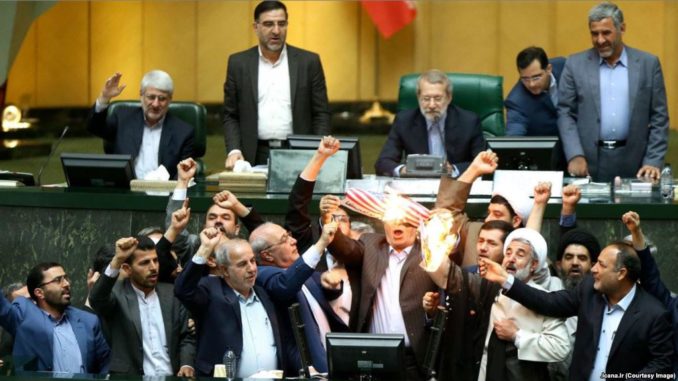
Consequences of Iran joining the United Nation’s Convention on Terrorism Financing was debated in the Iranian regime’s parliament last weekend and the parliament voted to postpone all talks about the country joining the Convention for two months. It is expected that Iran will wait to see what the future holds for the 2015 Iran nuclear deal and then resume the debate in a couple of months.
The question of joining the Financial Action Task Force’s (FATF) is something that is sparking tensions in the Iranian parliament and the hardliners made it very clear that they do not want Iran to be subjected to new laws that bring the country up to international standards. The conservative lawmakers have been critical of the plans that have been ongoing since last year and they have petitioned against joining the Terrorism Financing Convention claiming that joining the convention will have several consequences for the regime.
Their reasoning for this is because they do not want the financing of its allies in the region to be stopped. This includes the financing of groups such as Hamas and Hezbollah that are classified as terrorist organisations by the European Union and the United States. Legislation would also lead to members of the Iranian regime’s Islamic Revolutionary Guard Corps (IRGC) being listed as terrorists by the United States.
Lawmakers in Iranian parliament held a vote with the result being 138 to 103 in favour of having a two month suspension on debating whether Iran should join the Terrorism Financing Convention.
Iran is the only country other than North Korea to be on the FATF blacklist, making it more difficult for the Islamic Republic to access global banking. The FATF is due to look into Iran’s current status in a few weeks.
Some officials in Iran are saying that there is no point in Iran joining the FATF because the United States has pulled out of the deal and sanctions are to be fully reapplied. Although the deal remains in place with the other signatories – China, Russia, France, the United Kingdom and Germany – many trade deals are falling apart because of fear of reprisals vis-à-vis US sanctions.
Iranian officials have been outspoken about the potential conventions with some wholeheartedly backing them and others vehemently against them. The country’s deputy foreign minister – Abbas Araghchi – said: “This very parliament was the victim of Daesh terrorism this time last year (…) Without international cooperation and joining international conventions, it is impossible to confront it. Inside the country there are some holes and weaknesses in banking networks, which unfortunately facilitates terrorist groups and drug-smuggling.”
On the other hand, a spokesman for parliament’s National Security and Foreign Policy commission, Hosseini Naghavi-Hosseini, said: “Why do we want to bind ourselves to frameworks and requirements which have been designed by our enemies?”
The Iranian regime’s support for terrorist organisations is being flagged up by many leaders and groups, not least by the National Council of Resistance of Iran (NCRI) – the main opposition group that is working at defending the people against the tyrannical regime. Starting at the end of last year, the people called for the regime to concentrate on the issues at home and to leave Syria.
On 30th June, the NCRI will be welcoming tens of thousands of Iranians to its annual Free Iran rally in Paris where numerous dignitaries, foreign officials and activists will gather to call for change in Iran.

